The Atlantic Ocean, with its vastness and enigmatic depths, captivates and astonishes us. It’s an integral part of our planet, influencing climates, economies, and cultures across the globe. Let’s unravel the mysteries and explore the astonishing facts that define this mighty ocean, shaping our world and leaving us in awe of its magnificence.
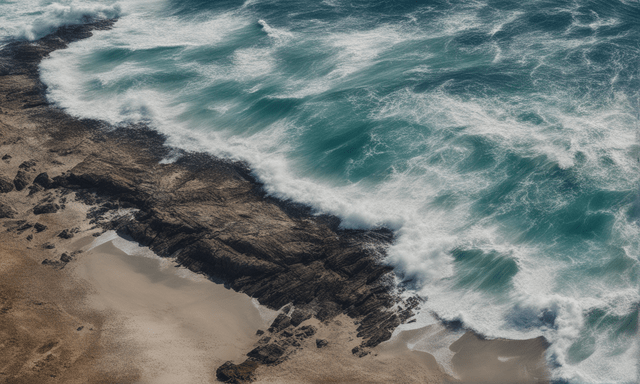
The Atlantic Ocean, Earth’s second-largest expanse of water, beckons with its vastness and mystery, spanning approximately 41 million square miles. It touches the shores of Africa, the Americas, and Europe, significantly influencing global climates and supporting diverse marine life. Oceanographers continue to uncover its hidden depths, revealing its secrets.
This immense body of water seamlessly connects continents, all while it silently guards captivating secrets that have shaped weather patterns and human history. Furthermore, it serves as a grand orchestra of biodiversity, where whales, dolphins, and countless species thrive within its various ecosystems. As we marvel at the Atlantic Ocean’s riches, it continues to inspire awe and offers a profound reflection of the beauty within our natural world, alluring us to delve deeper into its astonishing facts and marvels.
Eastern U.S. States with Atlantic Ocean Shorelines
- Maine: Known for its rugged coastline and picturesque lighthouses.
- New Hampshire: Offers a charming New England coastline with beautiful beaches.
- Massachusetts: Home to historic cities like Boston and the famous Cape Cod.
- Rhode Island: The “Ocean State” boasts sandy shores and a rich maritime history.
- Connecticut: Features a mix of coastal towns and urban waterfronts.
- New York: Offers diverse coastal landscapes, including Long Island and New York City’s shoreline.
- New Jersey: Known for its vibrant boardwalks and Atlantic City’s entertainment.
- Delaware: A small state with serene beaches and wildlife refuges.
- Maryland: Famous for the Chesapeake Bay and the city of Baltimore.
- Virginia: Combines history, culture, and pristine beach destinations.
- North Carolina: Features the Outer Banks and charming coastal towns.
- South Carolina: Offers beautiful beaches and historic plantations.
- Georgia: Known for its unique barrier islands and coastal charm.
- Florida: A popular tourist destination with a wide range of coastal experiences, from Miami to the Florida Keys.
Basic Fun Facts About Atlantic Ocean
- Atlantic Ocean: Earth’s Second-Largest Wonder
- Vastness of the Atlantic: 41 Million Square Miles
- Connecting Continents: The Atlantic’s Global Role
- Marine Diversity: Life Beneath Atlantic Waves
- Gulf Stream’s Warm Embrace: Atlantic Temperature
- Island Gems: Treasures of the Atlantic
- Trade’s Lifeline: Historical Significance
- Hurricane Alley: Atlantic’s Fury and Beauty
- Time Capsule of History: Shipwrecks and Exploration
- Beneath the Surface: Atlantic’s Hidden Landscapes
- Influencing the World: Atlantic’s Weather Power
- Endless Exploration: Secrets of the Atlantic Ocean
Also Read this: 50 Incredible Fun Facts about Missouri
Lesser-Known Facts About Atlantic Ocean
- Deepest Point: Puerto Rico Trench, deeper than the Grand Canyon.
- Iceberg Alley: Where icebergs drift from the Arctic to the Atlantic.
- Sargasso Sea: A unique area with floating mats of seaweed.
- Atlantic Hurricanes: The Atlantic is a breeding ground for hurricanes.
- The Bermuda Triangle: A mysterious area known for disappearing ships and planes.
- Ocean Conveyor Belt: The Atlantic plays a vital role in global climate regulation.
- Diverse Marine Life: Home to the endangered North Atlantic right whale.
- Ancient Shipwrecks: Thousands of shipwrecks lie on the Atlantic floor.
- Volcanic Activity: Underwater volcanoes shape the Atlantic’s seafloor.
- Underwater Mountain Range: The Mid-Atlantic Ridge spans the ocean’s length.
Also Read this: 60 Interesting & Fun Facts About Utah
Exploring the Atlantic Ocean: Nature’s Marvel and History’s Canvas
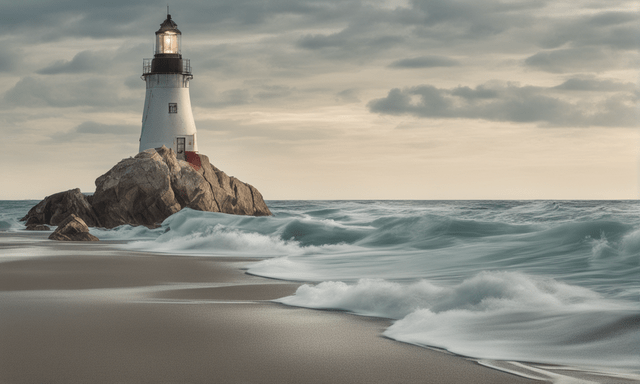
Climate
- The Atlantic Ocean spans a wide range of climates, from the Arctic in the north to tropical regions near the equator.
- It influences weather patterns across the Americas and Europe through its ocean currents and trade winds.
Temperature
- The temperature of the Atlantic Ocean varies greatly, with surface waters ranging from freezing in the North Atlantic to warm tropical waters in the South Atlantic.
- The Gulf Stream, a warm ocean current, affects the climate of the eastern United States and western Europe.
Marine Life
- The Atlantic Ocean is home to a diverse array of marine species, including whales, dolphins, sharks, and various fish species.
- The Sargasso Sea, located in the North Atlantic, hosts unique ecosystems and floating mats of Sargassum seaweed.
Islands and Coastlines
- The Atlantic Ocean features a wide range of coastal landscapes, from rocky cliffs in Ireland to sandy beaches in the Caribbean.
- It is surrounded by numerous islands, including the Azores, Bermuda, and the Canary Islands.
Ocean Exploration
- The Atlantic Ocean has been a crucial route for exploration and trade throughout history, with famous voyages like Christopher Columbus’s journey to the Americas.
- Deep-sea exploration continues to reveal hidden wonders, such as hydrothermal vents and previously undiscovered species.
Historical Significance
- The Atlantic Ocean has played a pivotal role in human history, facilitating trade, cultural exchange, and the movement of people between continents.
- It holds the secrets of countless shipwrecks, from ancient vessels to modern wrecks like the Titanic.
Weather Phenomena
- The Atlantic is known for its hurricane activity, with the hurricane season typically peaking from June to November.
- It experiences events like the North Atlantic Oscillation, which can influence the weather in Europe and North America.
Geological Features
- The Mid-Atlantic Ridge, a massive underwater mountain range, runs through the Atlantic Ocean, shaping its seafloor.
- The ocean contains a variety of geological formations, including underwater volcanoes and deep trenches like the Puerto Rico Trench.
Also Read this: 50 Astonishing Fun Facts about Mississippi
Oceanic Dimensions
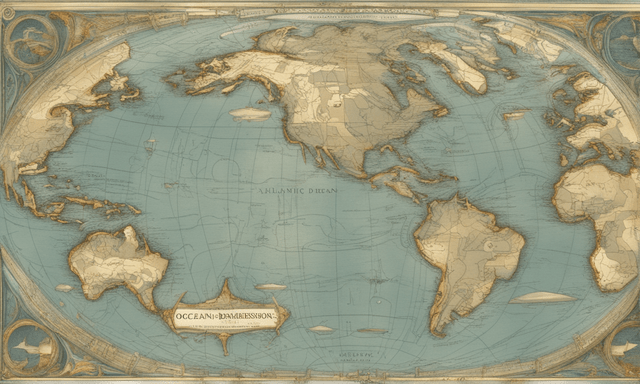
Second Largest Ocean
Covering over 20% of the Earth’s surface, the Atlantic Ocean stands as the second-largest ocean in the world, embracing an expansive aquatic realm. Additionally, its size and influence on the planet are truly staggering.
Immense Water Volume
With a volume of approximately 354.7 million cubic kilometers, this ocean holds an awe-inspiring amount of water, affecting global climates and ecosystems. In essence, its sheer volume plays a vital role in regulating the Earth’s climate systems.
The Longest Mountain Range
Beneath the ocean’s surface lies the Mid-Atlantic Ridge, the longest mountain range on Earth, stretching over 16,000 kilometers. Consequently, it’s a geological marvel with significant implications for the ocean’s topography.
A Diverse Coastline
The Atlantic Ocean boasts a diverse coastline, stretching for about 111,866 kilometers, adorned with unique landscapes and vibrant cultures. Moreover, these coastal regions have shaped human history and continue to influence our lives.
Marine Marvels
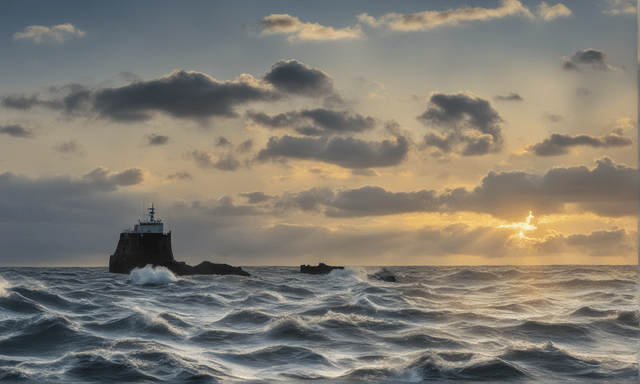
The Sargasso Sea
In the North Atlantic, you’ll find the Sargasso Sea, a remarkable region unique for its floating mats of Sargassum seaweed, creating a distinct marine ecosystem. Similarly, this distinctive sea is vital for many marine species and ecosystems.
Enchanting Bioluminescence
Certain areas of the Atlantic Ocean exhibit bioluminescent organisms, creating a magical glow at night, captivating the hearts of onlookers. Hence, it’s a testimony to the ocean’s fascinating biodiversity.
Spectacular Coral Reefs
The Atlantic Ocean houses stunning coral reefs, like the Bahamas’ Andros Barrier Reef, providing habitat for a myriad of marine life. Likewise, these reefs are hotspots of biodiversity and a marvel to behold.
Atlantis Anecdotes
The Atlantic Ocean has long been associated with the mythical lost city of Atlantis, fueling imaginations and explorations throughout history. In essence, it’s a testament to the ocean’s role in inspiring human myths and legends.
Oceanic Phenomena
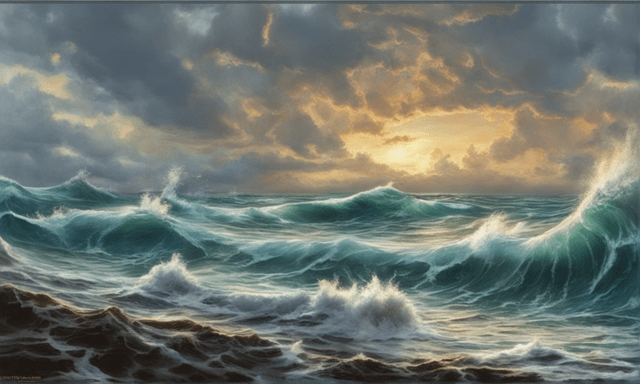
The Gulf Stream
The Gulf Stream, a powerful ocean current, influences climate and weather patterns, significantly impacting the East Coast of the United States. Additionally, its effects are far-reaching and vital for understanding weather systems.
Mysterious Bermuda Triangle
The Atlantic Ocean encompasses the Bermuda Triangle, shrouded in mystery due to unexplained disappearances of ships and aircraft, sparking intrigue and speculation. Moreover, this phenomenon continues to captivate the imagination of many.
Oceanic Tides
The Atlantic Ocean experiences notable tidal movements, creating fascinating natural phenomena, attracting scientists and enthusiasts to study its dynamics. Similarly, these tides are a window into the ocean’s immense power.
The Great Atlantic Garbage Patch
Sadly, like other oceans, the Atlantic is affected by plastic pollution, leading to the formation of a ‘garbage patch,’ a pressing environmental concern. In contrast, this highlights the urgent need for global environmental action.
Historical Significance
Columbus’s Voyages
Christopher Columbus undertook his historic voyages across the Atlantic Ocean, forever altering the course of world history and exploration. Likewise, these voyages had profound implications on the world.
Transatlantic Cable
In 1858, the first transatlantic telegraph cable was laid across the Atlantic Ocean, revolutionizing communication between continents. Therefore, it marked a significant milestone in global communication.
World War II and the Atlantic
The Atlantic Ocean played a vital role during World War II, serving as a strategic theater for naval battles and transportation of troops and supplies. Consequently, it was a crucial battleground during the war.
The Titanic Tragedy
The ill-fated RMS Titanic’s sinking in the Atlantic Ocean remains a somber reminder of the perils of transatlantic travel in the early 20th century. Nevertheless, it brought significant changes to maritime safety regulations.
Aquatic Fauna
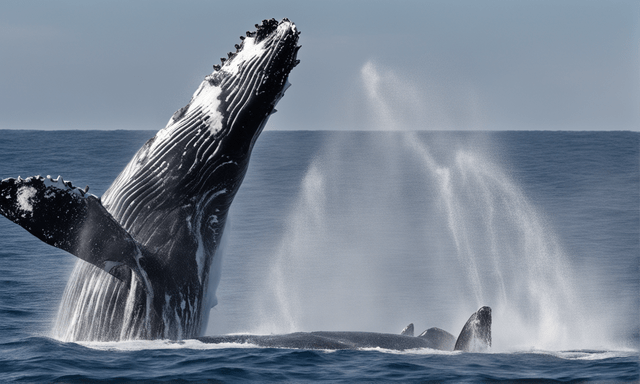
Humpback Whales
The Atlantic Ocean hosts migrating humpback whales, an awe-inspiring spectacle for those lucky enough to witness their journey. Furthermore, it showcases the ocean’s role as a habitat for majestic marine creatures.
The Magnificent Blue Marlin
Fishing enthusiasts are drawn to the Atlantic in pursuit of the formidable blue marlin, a prized catch for deep-sea anglers. Similarly, this fish is a symbol of the ocean’s bounty.
The Atlantic Puffin
The Atlantic Ocean is a habitat for charming Atlantic puffins, captivating birdwatchers with their distinctive appearance and behavior. Consequently, it is a haven for diverse birdlife.
Leatherback Sea Turtles
These gentle giants, the leatherback sea turtles, find their nesting grounds and habitat in the Atlantic Ocean, contributing to its diverse marine life. Hence, it showcases the importance of the ocean for endangered species.
FAQs
The Atlantic Ocean is the second-largest ocean on Earth, covering approximately 41 million square miles.
The Gulf Stream is a warm ocean current in the Atlantic Ocean that significantly influences the temperature of the surrounding waters.
The Atlantic Ocean has played a pivotal role in history, facilitating trade, exploration, and cultural exchange between continents.
The Sargasso Sea is a distinct area in the North Atlantic with floating mats of Sargassum seaweed, hosting unique ecosystems.
The Atlantic Ocean’s ocean currents and trade winds have a profound influence on global weather patterns and climate regulation.